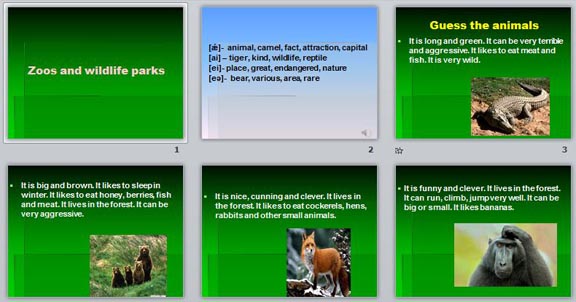Цель урока:
Познакомить учащихся с организацией зоопарков и парков дикой природы
Задачи урока:
1. Развитие навыков устной речи по теме «Разговор о животных»
2. Тренировка навыков чтения с полным пониманием прочитанной информации;
3. Развитие и совершенствование лексических навыков;
4. Воспитание познавательного интереса
5. Знакомство со структурой «If I…, I would…»
Оборудование: компьютер, проектор
ХОД УРОКА
1. Организационный момент.
T: Good morning, boys and girls! I am glad to see you. Who is on duty today? Let’s begin our lesson. Today we shall speak about animals, zoos and wildlife parks and discuss what is the difference between the zoo and the wildlife parks. But first let's practice English sounds and words.

2. Фонетическая зарядка.
Teacher: Listen, repeat and read.
[ǽ]- animal, camel, fact, attraction, capital
[ai] – tiger, kind, wildlife, reptile
[ei]- place, great, endangered, nature
[eə]- bear, various, area, rare
3. Речевая разминка.
T.: Answer my questions, please:
Do you like animals?
Have you got a pet?
What pet have you got?
What is your pet’s name?
4. Активизация лексических навыков
Teacher:. The next task is to guess the animals. Please, be very attentive, we shall check your answers on the screen.
It is long and green. It can be very terrible and aggressive. It likes to eat meat and fish. It is very wild. What is it? (a crocodile)
It is big and brown. It likes to sleep in winter. It likes to eat honey, berries, fish and meat. It lives in the forest. It can be very aggressive. What is it? (a bear)
It is nice, cunning, and clever. It likes to eat cockerels, hens and rabbits and other small animals. What is it? (a fox)
It is funny and clever. It lives in the forest. It can run, climb, jump very well. It can be big or small. It likes bananas. What is it? (a monkey)
It is the second biggest animal in the world. It can eat 300 kilos of food and drink 200 liters of water. It lives in Africa and India, it is kind, clever and very intelligent. What is it? (an elephant)
This animal is very unusual. It cannot walk, it cannot run, it cannot fly, it can only jump. It has a front pocket and in the pocket it carries a baby. It lives in Australia. Name this animal. (a kangaroo)
Teacher: Would you like to describe animals?
Teacher: You have to make up sentences:
Crocodiles
Camels in the seas and oceans
Eagles in the rivers
Whales in the forests
Dolphins live in the desert
Sheep in the mountains
Horses in the zoo
Monkeys at a farm
Pandas in the country
Sharks
Teacher:. Look at the blackboard, please. You can see some English words there. The task for you is to to put the letters in the right order
nimaal (animal)
rdaengeden (endangered)
pheleant (elephant)
lozoocalgi (zoological)
tyesoci (society)
cwhat (watch)
gfith (fight)
5. Развитие навыков устной речи
Teacher:. Have you ever been at the zoo?
What animals can you see in the zoo?
What animals are in danger now?
What do you know about London Zoo and Moscow Zoo?
Teacher:. I can see you are interested in animals and their life. What would you do if you were a director of a zoo?
Example:
If I were the director of a zoo, I would buy another tiger for my zoo.
Use: feed the animals well, buy exotic and rare animals, move the zoo to the country, take away the cages, make a nice pond with clean water in the centre of the zoo, make a dolphin show, close the zoo.
6. Развитие навыков чтения
Teacher:.Now open your books on p.55, ex. 30.
Read and translate the following phrases. Use them in your own sentences.
to save endangered animals
to join a society / organisation / club / your classfriends
world – all over the world / world peace / the natural world
kind – a kind granny / all kinds of things / 400 kinds of insects
Teacher:.Very good. Let’s read the text about Whipsnade wildlife park (ex. 31)
Teacher:.Say if the following sentences are true or false:
At Whipsnade, you can learn and understand more about the lives of endangered animals and how to save them.
At the children’s farm, you can get closer to wild animals.
The keepers of the park introduce animals around the park for you.
You can bring along your own dog into the park.
Teacher: Very good. We shall watch the video about Whipsnade wildlife park.
7. Совершенствование навыков устной речи на основе прочитанного текста
-Teacher:. Now you will read and discuss the questions from ex.32.
1. What is the difference between a zoo and a wildlife park?
2. Why do people keep animals in zoos and parks?
3. Do you think you can learn more about animals in zoos or in wildlife parks?
4. Why do the rules of the park say that you can't take your pets with you?
5. What do you think is better for animals:
-to live in zoos?
-to live in wildlife parks?
-to live in the wild?
Teacher: Listen and read the poem. Say if you agree with the author (ex. 33)
8. Итог урока
Teacher:.Our lesson is over. Your hometask is to write what would you do for animals.

 Получите свидетельство
Получите свидетельство Вход
Вход












 «Зоопарки и парки дикой природы» (английский язык) (20.77 MB)
«Зоопарки и парки дикой природы» (английский язык) (20.77 MB)
 1
1 610
610 96
96 Нравится
0
Нравится
0


